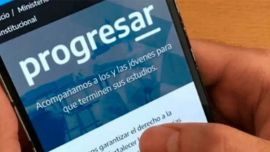More than a third of Argentines – some 16 million people – were living in poverty at the end of last year, according to official data released Tuesday.
The INDEC national statistics bureau said that 35.5 percent of the population were considered poor in the second half of 2019 – a figure that is likely to worsen as a result of the ongoing nationwide shutdown amid the coronavirus pandemic.
The period, which marked the end of former president Mauricio Macri's term in office, saw the poverty rate grow by 3.5 percentage points year-on-year, though it represented a rise of just 0.1 percentage points on the figure recorded in the first half of 2019.
Argentina's current leader, President Alberto Fernández, took office on December 10.
Extreme poverty was recorded by INDEC at eight percent – a rise of 1.3 points on the end of 2018 and 0.3 percentage points higher than in the initial six months of last year.
Unsurprisingly, the poverty rate was higher in the overcrowded periphery of Buenos Aires, where some 11 million people live. INDEC said 40.5 percent of those living in the region were poor, with 11.3 percent considered destitute.
High rates were also recorded in Concordia (51.1 percent), Salta (45.5 percent), Santiago del Estero (45.2 percent), Formosa (41.6 percent), Posadas (41.3 percent) and Greater Mendoza (38.6 percent). By way of contrast, In Buenos Aires City only 13.5 percent of porteños were considered poor.
More than half of kids under 14 living in poverty
According to the bureau, more than half (52.3 percent) of children under the age of 14 are living in poverty. That figure is based on data taken from the country's 31 main urban regions.
The data will make for disappointing reading for former president Macri, who famously campaigned on a vow that he would deliver "zero poverty." The Cambiemos leader asked voters to judge him on his record, regularly citing the importance of tackling poverty.
The highest poverty rate recorded since records began being kept in Argentina was registered in 2002: 54.2 percent.
The INDEC bureau was the victim of political pressure during ex-president Cristina Fernández de Kirchner's 2007-2015 two-term spell in power, producing unreliable statistics. That fact makes it difficult to judge what the rate was when Macri took office in December 2015, though during his second year in office, INDEC said poverty stood at 25.7 percent.
The respected Social Debt Observatory unit of the Catholic University of Argentina (UCA), which also measures poverty and other social and economic indicators, said toward the end of last year that around 40 percent of the population was living in poverty. However, it uses a multi-dimensional way to measure poverty and is not based solely on whether a person or a family can afford INDEC's basic food basket.
Argentina is currently gripped by a recession that has lasted almost two years and its economy is now all but shut down in a bid to halt the spread of the novel Covid-19 coronavirus. Gross domestic product fell by 2.1 percent last year and 2.5 percent the previous year.
– TIMES/AFP/NA





















Comments